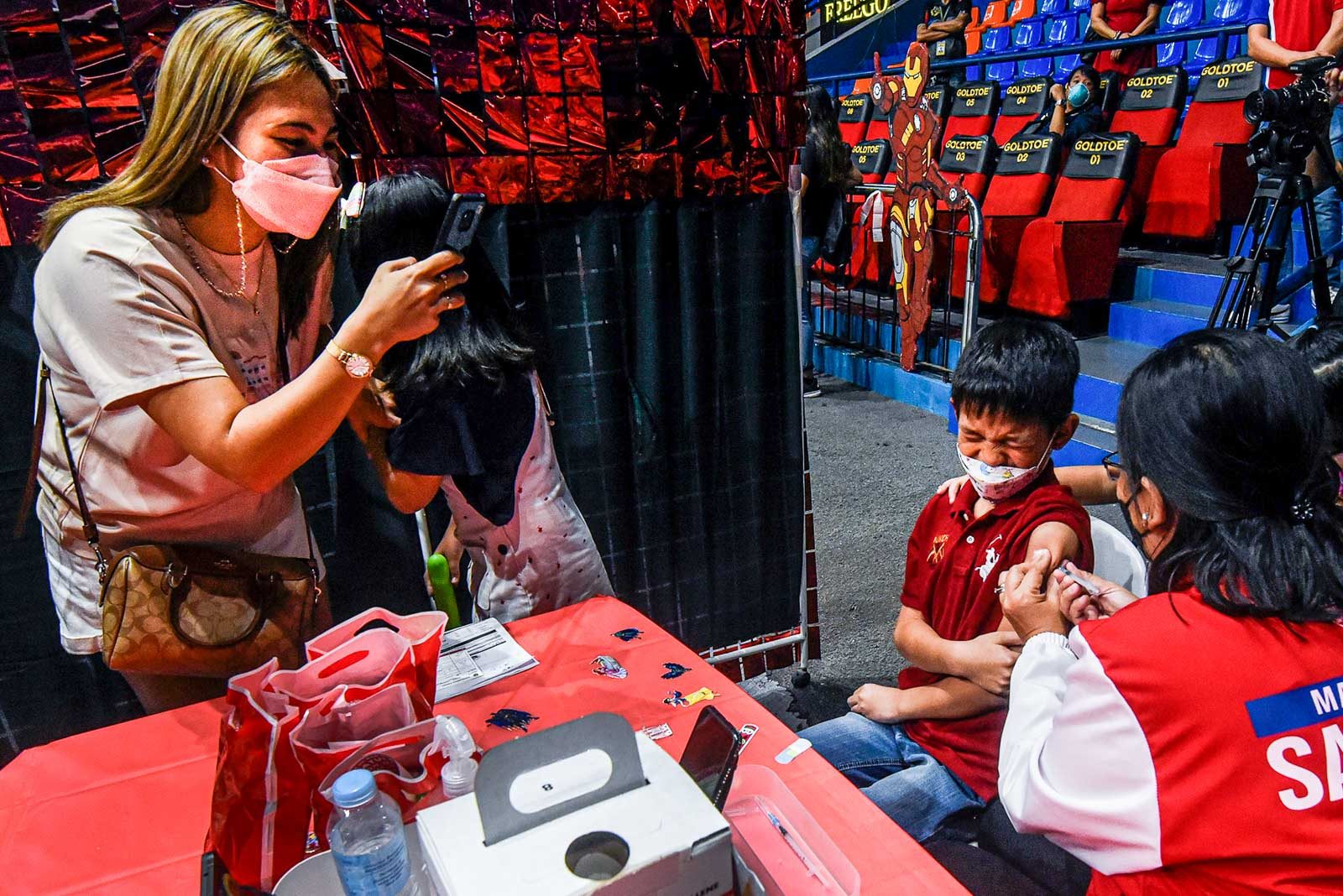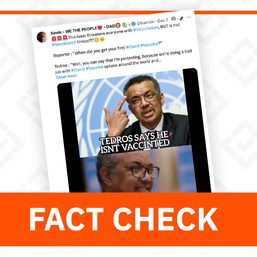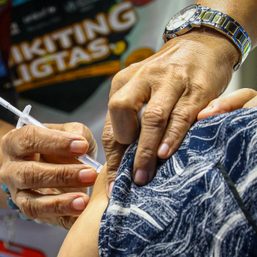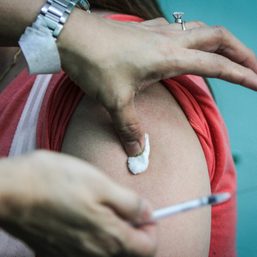SUMMARY
This is AI generated summarization, which may have errors. For context, always refer to the full article.

The Department of Health (DOH) declared the country had “overcome” Omicron as the average number of daily cases continued to fall for the third consecutive week, after skyrocketing in early January.
The DOH said the surge fueled by Omicron was the Philippines’ largest and fastest increase in cases, “but an equally fast decline was observed.” On a national level, the country was considered low-risk for COVID-19, though cases still hovered in the thousands.
Here’s what we’re watching this week of February 20, 2022:
Booster protection wanes too
Recent data from United States Centers for Disease Control and Prevention (CDC) suggested that protection offered by COVID-19 boosters against severe disease dropped after just four months, raising the possibility that a fourth shot may be needed for high-risk groups like the elderly.
- The New York Times reported that data from the CDC offered the first real-world evidence of the waning potency of boosters, after preliminary research from the United Kingdom and Israel hinted at similar outcomes.
- What the team behind the CDC research looked at: Data from 10 states collected between August 26, 2021, and January 22, 2022 – a period where the Delta and Omicron variants “accounted for more than 50% of cases in the country.” Specifically, they studied 241,204 visits to emergency departments or urgent care facilities and 93,408 hospitalizations among adults older than 18.
- What they found: After a second mRNA dose, protection against emergency department and urgent care visits “declined from 69% within two months of the second dose to 37% after five months or more. Booster shots restored those levels to 87%.” But, after a booster, protection against the same factor dropped from 87% to 66% within four to five months and to 31% after five or more months after receiving the additional shot.
- Data was not broken down by age or if people received a booster or third shot for immunocompromised patients. So if the population seeking emergency care “was skewed toward older adults or those who have weak immune systems, the booster shots may have seemed less effective than they really are,” the NYT reported.
- For individuals younger than 65, we know that vaccines remain highly protective – especially against severe outcomes, like hospitalization and death.
- What all these numbers mean then is, “There may be the need for yet again another boost – in this case, a fourth-dose boost for an individual receiving the mRNA – that could be based on age, as well as underlying conditions,” the Times quoted infectious disease specialist and White House COVID-19 adviser Dr. Anthony Fauci.
- Before officials will even be able to recommend a fourth shot, scientists need to figure out who may be at high risk and when, despite receiving a booster shot.
- This was the case for recommending boosters especially for the elderly in the Philippines.
- These findings were the case for mRNA vaccines, which are just two of eight vaccines used in the Philippines. More data is needed on what the effectiveness of boosters look like for inactivated vaccines like Sinovac or adenovirus vaccines like AstraZeneca and Sputnik V.
- Vaccine orders in 2022 have so far only factored in the need for an additional third shot. If high-risk individuals and seniors may need a fourth shot, supply for roughly 25 million people will be needed.
- Despite the waning protection of booster shots, health experts underscored that these are still needed, especially as they offer added protection in light of the Omicron variant. In particular, individuals who were boosted were 25 times more protected against the variant.

Wait stretches for little kids’ vaccines
The US Food and Drug Administration (FDA) was earlier expected to tackle vaccine data for kids at least 6 months to 4 years old, with the goal of granting emergency approval for the group sometime within this month. The meeting that was supposed to take place on February 15 was postponed.
- The FDA held off on the meeting to study the possibility of offering a third dose for the group, with data expected to become available sometime in April.
- Pfizer was initially going to apply for emergency use of its vaccine in the group, after a clinical trial showed that a two-dose regimen offered protection to infants aged 6 to 23 months. But, paradoxically, two doses failed to mount a strong immune response among kids aged 2 to 4. This led the firm to test a third shot.
- In terms of safety, the vaccine appeared to be safe for both groups, and side effects were “tolerable.”
- Why consider it in the first place then? Apoorva Mandali, a science journalist for the Times, reported that when the vaccine trial continued throughout December, some children were infected with Omicron – a situation that allowed scientists to see how the vaccine stood up against the variant and prompted the FDA to consider authorizing the shot. They decided against this after more infections were reported.
- Weighing the need to vaccinate little kids and waiting for more data on vaccine efficacy, some experts say the decision to wait is prudent in the interest of protecting confidence in vaccines.
- “The stakes are high and they’re never higher than for vaccines in this youngest age group, both for their effects on this vaccine and the effects on childhood vaccination and vaccine confidence generally,” Jason Schwartz, an assistant professor of health policy at the Yale School of Public Health, told STAT News.
- Pandemic officials in the Philippines earlier raised plans to vaccinate kids at least 6 months old, but, like in the US, this will still be a waiting game.
- Protecting parents’ confidence in vaccines for this age group is especially crucial in the aftermath of the 2017 Dengvaxia scandal and considering infants need to avail of routine immunization programs.
Vaccines protect vs long COVID-19
A rapid review of data from the UK Health Services found that people who were fully vaccinated were less likely to develop long COVID, even if they experienced a breakthrough infection.
- The UK Health services looked at data from 15 studies around the world whose findings suggested that vaccines reduced the risk of infection and illness.
- In studies that looked at the effect of shots in people who already had long COVID, data showed vaccines improved symptoms “either immediately or over several weeks.” (But some cases still reported a worsening of symptoms at the time of the study.)
- Knowledge about long COVID is still limited at this time, but many who experience this share that the condition can be debilitating. A DOH official earlier said an estimated 10% of cases may be those with long COVID.
In case you missed it: Nearly a year into the Philippines’ vaccine drive, unequal distribution of doses and a lack of access in many regions threaten to keep out of reach the government’s goals of covering 70% of the population by March and 90% by June.
Rappler’s Newsbreak Beyond the Stories podcast tackles the issue in depth below:
– Rappler.com
Add a comment
How does this make you feel?
![[PODCAST] Beyond the Stories: Bakit may mga rehiyong kulang pa rin ang COVID-19 bakuna?](https://www.rappler.com/tachyon/2022/02/newsbreak-beyond-the-stories-landscape-with-topic.jpg?fit=449%2C449)





There are no comments yet. Add your comment to start the conversation.